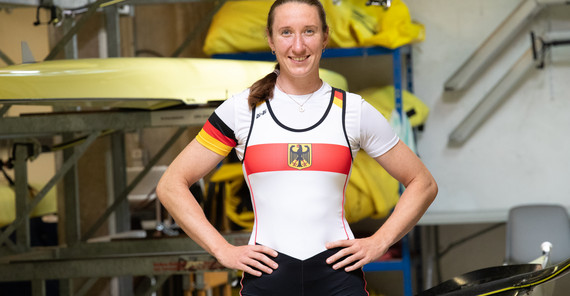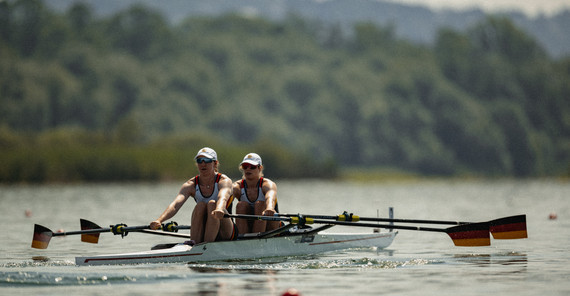Maren Völz is a student at the University of Potsdam and a competitive athlete. Her club is the “Ruder-Club Potsdam e.V.”, but as a squad member in the national team of the German Rowing Association she trains at the Olympic Training Center at Jungfernheideweg in Berlin’s Charlottenburg district. The young athlete already accomplished a lot: At the 2023 European Championships in Bled, Slovenia, she finished 5th in the double sculls, and in 2020 she made it to the top of the podium with her team in the quadruple sculls at the U23 European Championships.
This is what a perfectly normal day looks like for the 23-year-old, who is currently preparing for the 2024 Summer Olympics in France: Before eight in the morning, she will do some gymnastics and mobilization. Then rowing training begins on the Hohenzollernkanal: To the east lies a lock, to the west the canal leads to the Havel river and Lake Tegel. “The area is quite extensive.” At lunchtime, a cook will provide meals for the athletes. “Food is important,” Völz says and smiles. In the afternoon, there is another session of rowing, weight training, or cycling. To perfect their technique, the rowers also use video analysis. “Putting the blade in the water at the right angle, moving it efficiently, and extracting it without losses is a process that takes years of training.” Between 2 p.m. and 5 p.m. it’s time to go home.
As training ends, cramming begins: When she is not rowing, Maren Völz prepares for exams at the university. She is currently studying for an exam related to a lecture she attended two years ago. The athlete has been enrolled in the B.A. Psychology program since the winter semester of 2020/21. “I am deliberately studying at a slower pace,” says the 23-year-old. After all, the team is often out and about even on weekends, at training camps or competitions. “The COVID pandemic was actually advantageous for me,” she says. That is because she was able to prepare for and do follow-up coursework for many courses online. Völz is not attending any in-person lectures at the moment. It’s all about the Olympics now.
The athlete has been familiar with the Havel river since childhood. After all, her sporting career began at the rowing club in Lehnin, Brandenburg, where Maren Völz grew up. “A neighbor took me to the club when I was about nine years old.” In elementary school, she was then scouted for rowing by the Potsdam “Friedrich Ludwig Jahn” sports school, with success. That is how she became a competitive athlete in Potsdam. Today, she studies here – also thanks to a cooperation between the Olympic Training Center and the university. This gives her access to equality measures to compensate for disadvantages so that she can take exams on an individual basis and better balance her training and course schedules. In 2021, she also received the top-class sports scholarship from the sports chapter of the Potsdam University Society as a promising young talent and student with outstanding achievements. How does she manage to excel in exams as well as rowing? “When I take an exam, I’m well prepared so that I perform well,” Maren Völz says pragmatically. The scholarship from the University Society was subsequently extended by one year.
One thing she likes about her chosen degree program is that it opens up many career opportunities. However, Völz has not yet decided which path she wants to take. After the Olympics, she would like to complete internships to gain practical insights and then find a specialization in a master’s degree. For now, she hopes that she will actually qualify for the Games. Eight women are in the Olympic squad, but a maximum of six will be “on board” in Paris. This is a particular challenge for the team: “We have only been training together since May. Some of our opponents have been covering many kilometers together for years. But we are finding our way together.”
At the World Rowing Championships in Belgrade in September 2023, she and her teammate in the double sculls suffered their first setback. “We were a few hundredths too slow in the repechage to already qualify for the Olympic Games,” said a disappointed Völz. “Nevertheless, I am now looking forward to next year's preparations with motivation. Our team was able to qualify in the quadruple sculls at least, where we now have to find the best possible line-up for the Olympic Games.” The double sculls could also qualify retroactively next May.
It goes without saying that with all this pressure, competition within the team is also fierce. “But that spurs us on and makes us better,” says the student. And they still get along well in private. They all live near the training center. A big advantage, because time is a scarce commodity in the rowers' lives. “I hardly have any days off during the season. It is even difficult to find time to visit my parents.” Völz’s partner rows in the men’s national team in Dortmund, so it is also a challenge for them to find time to be together.
But Maren Völz is not one to give up – no matter if it is her studies or her sport. In February 2021, she suffered a slipped disc, spent several months doing physical rehabilitation, and trained a lot on her own after that. She successfully fought her way back and in the fall of 2022, she did not only join the adult class, but also made it onto the national team.
This text was published (in german version) in the university magazine Portal - Zwei 2023 (PDF).


